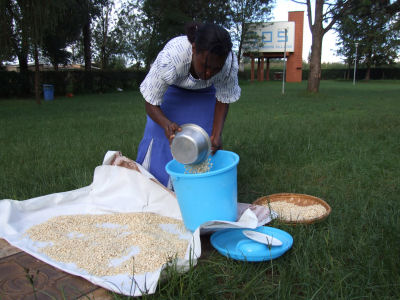SOS mothers in Kenya are feeling the impact of rising food prices
19/06/2008

Like the rest of the world, the people of Kenya are suffering due to rising food prices. The problems began around the time of the post-election crisis in January this year when over 100,000 people were displaced from the Kenya's 'breadbasket', the Rift Valley, so that crops could not be tended or planted. At the same time any imported goods were unable to reach the people living up-country due to road blocks manned by aggressive protesters. And to compound it all, 70% of Kenya's rice crop became infected by a fungus earlier this year. All this on top of a global food crisis caused by soaring prices.
SOS Children Kenya has not escaped the problems and SOS mothers are suddenly finding that their weekly budget no longer buys the same amount of food. Like all mothers they are using a mix of good housekeeping and ingenuity to ensure that children receive a balanced diet.
The Kenyan SOS mothers are coping in the following ways:
* They buy less of some items. For example, previously they bought potatoes and tomatoes by the sack, which lasted quite a while, but now they buy them in buckets. Fruit is not affordable on a daily basis.
* They forego some items, such as sausages, jam, condiments (e.g. tomato ketchup) and chicken.
* They are using food substitutes. Bread, which is a necessity, has become impossible on a daily basis and is substituted with things like home made chapattis (unleavened bread). Pancakes are infrequently cooked because the ingredients, flour, eggs and cooking oil are expensive. Tea, porridge and soup are interchanged more frequently. They substitute meat and fish protein with cereals, such as beans, green grams and lentils.
* They have introduced cheaper indigenous and traditional foods into family diets. Some mothers have introduced sweet potatoes, arrowroots, vegetables and grains. The product depends on the location as cassava will not necessarily grow in the same conditions as pumpkins.
* They are using good relations with suppliers by taking advantage of extended credit. However, this arrangement is impacting on their monthly budget because prices have, sometimes, gone higher then the rate at which house allowances are replenished.
* Mothers are shopping more frequently in the informal markets where the produce is cheaper than that bought from formal outlets, such as supermarkets, which have to deal with overheads.
* They have resorted to washable diapers instead of disposable ones when looking after babies.
* Treats, such as fast foods like pizza, are out.
* At an inter-village level SOS mothers are supporting each other with purchases of food. For instance, in Meru prices are slightly less expensive. Mothers are assisting each other by making food purchases on behalf of the other villages and sending it to them.
* Since utilities - water, electricity, etc- have also increased in cost, the mothers are only using washing machines to launder heavy articles such as bed linen, curtains, etc., while articles of clothing are hand washed.
* Entertainment and outings have become more creative. For instance, leather balls are still used, but when the children need to have more balls, they tightly roll some plastic bags and paper and tie them with string and fashion a ball to the size and purpose they want. This is the sort of thing that happens all over Africa, but usually in very poor areas.
How are the children affected?
While the SOS mothers become more and more inventive in order to cope with rising prices, the children have their own thoughts on the matter.
The mothers are drawing up shopping lists with help from their children who are learning how to budget. They see that shopping lists are not cast in stone and must be adjusted to suit the majority rather than individual whims. They learn that budgets are planning tools that help bring the limits in to focus.
They are also learning that the world economy and activities of other nations have a great impact on Kenya’s environment and economy. If there are any budding economists in the village they are learning 'on the job' so to speak.
It's not an easy time for SOS mothers with 10 children to feed but they are doing their best. They wonder how it all started and why prices have increased so much, but mostly they get on with their daily lives of providing love, care and security to the children who need it most.
Relevant Countries: Kenya.